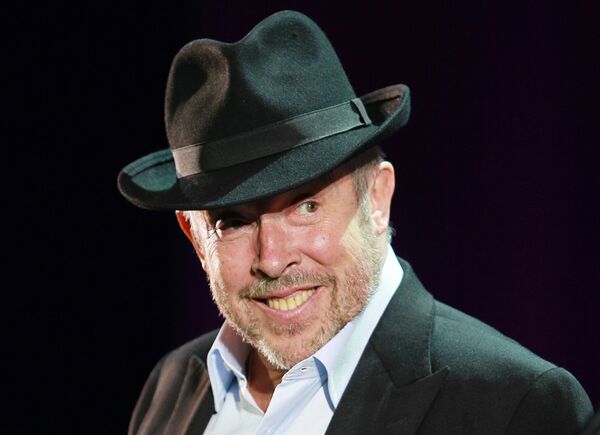A veteran Russian rock singer has made a hit in the blogosphere with a scathing song mocking Prime Minister Vladimir Putin.
The send-up tune's lyrics describe a clean-up effort in a small provincial town in advance of a Putin visit. Hobos have been taken away, muck cleaned off the streets, and a welcoming party gathers at a newly built railway station. It's all in vain, however: the guest of honor never arrives.
“Banners are set up all over town, smoke has been double checked over every chimney, and the grass painted green.” Yet the town of Kholuyovo - from the Russian word for ‘skivvy’ - is left disappointed.
Andrei Makarevich, lead singer of rock band Mashina Vremeni (Time Machine) was singing during a chat show on a popular Moscow radio station just days after Putin told a ruling United Russia party congress on September 24 he was bidding to return as president. Shortly after that, the rocker told Radio Liberty that Russians were being “robbed of the remains of their right of vote.”
A video of the performance, posted on YouTube by Russian émigré writer Andrei Malgin, has unleashed a wave of comment among bloggers, many arguing a Putin visit is the only way to get things moving in hundreds of the grim, backward provincial towns maladministered by local bigwigs.
Others have disparaged Makarevich’s loyal past, and suggested that the song, called "Putin is coming to our Kholuyovo," is "disguised Kremlin propaganda." Last year, Makarevich helped organize a meeting between some of the country’s most famous rockers and President Dmitry Medvedev, a well-known fan of British hard rock band Deep Purple. In 2008, he played in a concert celebrating Medvedev’s victory in the presidential election.
Dmitry Ivanov (a.k.a. kamikadze_d), one of Russia’s most prominent bloggers, said the song was just a “cause for a smile, nothing more.”
“A lot of strange stuff happens ahead of the elections,” he quipped.
Viktor Shenderovich, a popular satirist and the man behind Russia’s pioneering satirical puppet show Kukly, defended Makarevich, saying the 57-year-old rock star wanted to “distance himself from United Russia, Putin and all that filth.”
He described the song’s lyrics as “a very good text” and suggested it is symptomatic of widespread public sentiment.
It indicates that part of Russian society, “people who share Makarevich’s ideas,” have not yet “lost their shame,” Shenderovich added. “I think it’s quite an encouraging sign.”
Makarevich, however, dismissed suggestions that the song was a swipe at Russia's powerful prime minister.
"I don't understand what everybody's raging about," he said. "This song is about the serf's attitude toward authority that is customary in our country."
Putin has also appeared in a number of other songs, such as "Takogo kak Putin" (I want a man like Putin), released by a girl band during the height of his popularity in the early 2000s.
While there has been an unspoken ban on mocking Russia’s ruling duo in the official media, the web has been free of controls. Anyone who has observed the rise of Internet satire in Russia knows about vladimir.vladimirovich.ru, a spoof website which casts Putin as a megalomaniac, and can find the latest recital by poets Dmitry Bykov and actor Milkhail Yefremov.
“Political satire is alive and well in Russia,” Shenderovich said. “It’s another matter that it no longer exists on central TV channels. It does exist on the internet and the radio, though.”
Yet satire plays a smaller role in Russian society than it did in Soviet times, Alexander Morozov, an influential political blogger, told RIA Novosti. Compared to the “closeness” of the Brezhnev era, today’s Russia is a “new closeness,” where satire has lost much of its cutting edge, he said.
“The looming 12 more years of the Putin regime will be pathetic, and society will retreat further into its life in modern consumer culture,” he said.

